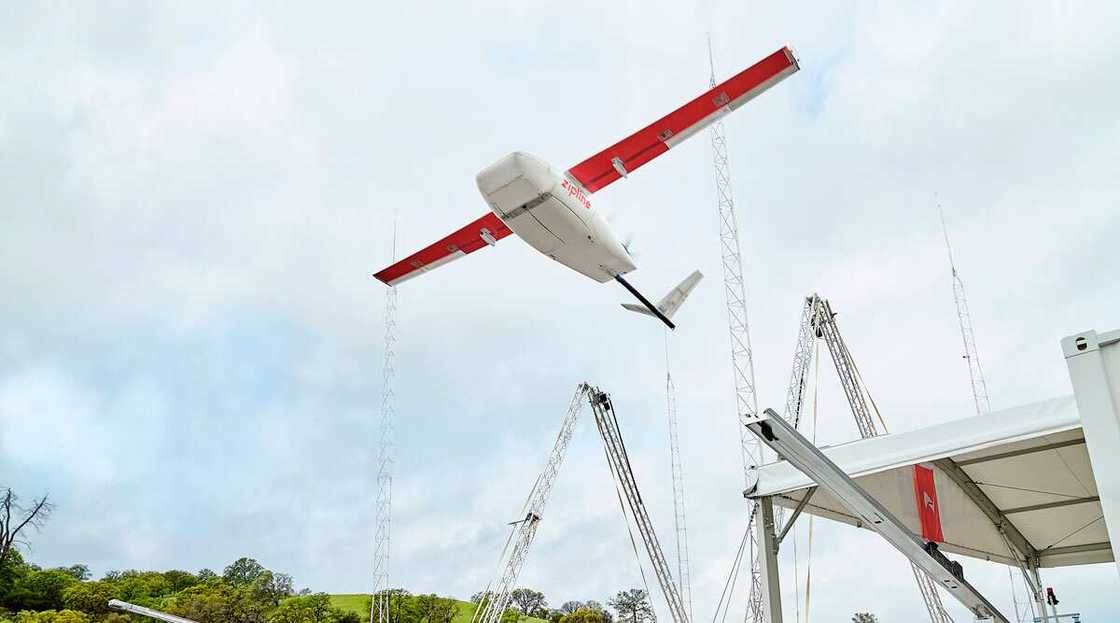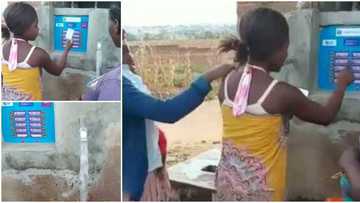OPINION: The Ambitious Plan of Revolutionizing Healthcare Delivery Using Drones
Editor's note: Dennis Kwabena, a health communications expert, writes on the ambitious plan of revolutionizing healthcare delivery using medical drones produced by Fly Zipline - operators of the world’s first national medical drone delivery system.
PAY ATTENTION: Join Legit.ng Telegram channel! Never miss important updates!
A major health delivery challenge facing almost all countries, particularly those in developing countries like Nigeria, is access to medical commodities. In cases where medical products are available in good quantities, there is likely the challenge of evenly distributing such life-saving commodities to hard-to-reach communities. This is one of many reasons why many health facilities in remote areas, especially those cut off by bad roads and river bodies, will have to refer patients to the city centers for health services or in some cases, patients resorting to self-medication, which could come with dire consequences.
Ambitious plan
Zipline seems to have the solution to this problem. Drone delivery, for many, is an idea for the future. Giants like Amazon, Google, and the likes are continuously exploring ways they can operationalize drone delivery on a commercial and national scale. Zipline has arrived as their medical drone is the first, “tried and tested” medical drone service that has been deployed on a national scale globally.

Source: Facebook
PAY ATTENTION: Install our latest app for Android, read the best news on Nigeria’s #1 news app
Zipline in Rwanda
The journey of Zipline in Africa started when the government of Rwanda took the bold decision to be part of the early adopters of the Zipline technology to deliver blood commodities to communities that are far from the city centers and thus hard-to-reach. A successful partnership with Zipline and the Rwandese government gave birth to the very first Zipline medical drone distribution site at Muhanga. From here, hundreds of blood commodities are delivered to health facilities on a daily basis.
Through a simple WhatsApp message, SMS, or call from an approved health worker to the Zipline delivery center, a staff is able to package the requested medical commodity and have it deployed to the requesting facility within minutes.
Today, not only has Rwanda added the delivery of other emergency medical commodities to the list of Zipline’s delivery (in addition to blood products) but the East African country has also contracted Zipline to build a second distribution center, so Zipline now provides delivery across the entire country. This, perhaps, demonstrates the success story of Zipline in Rwanda as it seems only companies who deliver on their mandate are able to stay in partnership with the government of Rwanda.
Zipline in Ghana
It is fair to say that Zipline’s success stories in Rwanda is what attracted the Ghanaian government to invite Zipline to set up a similar operational facility in Ghana. Today, Ghana hosts four of the Zipline medical drone delivery services, which many say is the biggest in the world in terms of capacity for daily delivery. On average, four hundred emergency medical products are delivered from the four distribution centers to over three hundred hospitals, clinics, or health centers in about seven regions of Ghana. These numbers translate into the number of lives saved as many of the medical commodities are critical and life-saving and mostly needed in emergency situations.
Significant to mention is the opposition that the partnership between Zipline and the Ghanaian government has generated. Whereas some doubted the capacity of Zipline and the drone technology in meeting the needs of health facilities, others thought investing in road infrastructure and equipping health facilities will be better for the people of Ghana than that of a drone delivering facility.

Read also
Beautiful photos, details of Calabria village that is offering people N13.6m to move in, Nigerians can apply
Inasmuch as the above oppositions were made within the context of priority and rightly so, it can be argued, based on the successes of Zipline, that the Ghana government took a well-calculated step at the time which is yielding very positive dividends.
As the entire world looks for solutions to equal access to COVID-19 vaccines to all parts of their communities, Ghana is leveraging the capacity of Zipline medical drones to deliver COVID-19 vaccines to health facilities in remote areas on-demand. Ghana, thus, is the first country worldwide to use medical drones to deliver both COVID-19 samples and vaccines to test centers and health facilities respectively. The concern of building cold storage facilities was no more on the table as Zipline already has those facilities and delivers exact numbers as required in a given minute.
Successes of Zipline
Apart from the support during COVID-19, many health facilities within the operational areas of Zipline, both in Ghana and Rwanda, attest to the fact that this service has been very helpful as a referral to other facilities as a result of the non-availability of medical commodities is becoming a thing of the past. During emergencies, Zipline is able to deliver blood and other products in a reliable and time-saving manner to save the lives of people. Health facilities do not need to store medicines in large quantities which sometimes go waste as a result of expiry as Zipline becomes a central hub to distribute evenly to those who need them.
Countries will continue to invest heavily in health care, and there is evidence on the ground to suggest the continuous investment of the governments of Ghana and Rwanda in respect of the health delivery system. But when available, technology comes in handy to do what might have taken the ‘future’ to do.
This technology is not only for Africa as it has already been deployed in North Carolina being used in the delivery of COVID-19 PPES. Some states in India have also signed an agreement with Zipline, and the company says it is in talks with many more countries and looks to be announcing other partnerships soon.
Safety features of the drone
Zipline drones are equipped with all the safety features one can think of. Besides the fact that it is unmanned, it has all other qualities of an airplane; two batteries, wings, and two propellers. One of these is always redundant and comes in handy in the rare chance the other fails. The drone can only fly planned routes approved in advance by national aviation authorities, so it can’t be used by anyone outside of Zipline or sent somewhere it is not supposed to be. And when a drone in flight encounters extremely bad weather or any technical fault for which the drone cannot continue on its route, it deploys its inbuilt parachute, making it safely land at its present location while at the same time communicating to the operators at the distribution site to retrieve it. The drones are also able to fly in all kinds of weather; both day and night.
The good news is that Zipline works hand-in-hand with all the in-country regulators to get the necessary permit and clearance before they start operations. The Civil Aviation Authorities also approve the flight routes and, if they want to, every fight before their takeoff.
If the stories in Ghana and Rwanda are anything to go by then one can assume that the Zipline technology is one that is on a mission to save lives and other countries might want to begin exploring the gains that can be derived from such a revolutionary technology.
Disclaimer: The views and opinions expressed here are those of the author and do not necessarily reflect the official policy or position of Legit.ng.
Your own opinion articles are welcome at info@corp.legit.ng— drop an email telling us what you want to write about and why. More details in Legit.ng’s step-by-step guide for guest contributors.
Contact us if you have any feedback, suggestions, complaints, or compliments.
Source: Legit.ng





